-
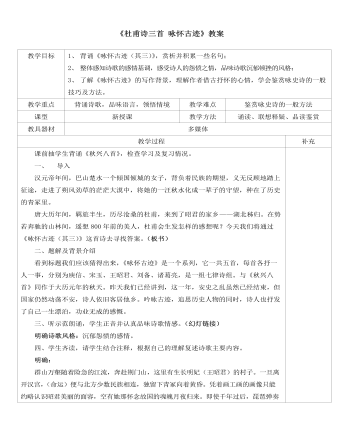
人教版高中语文必修3《杜甫诗三首 咏怀古迹》教案
“千载琵琶作胡语,分明怨恨曲中论。”“怨恨”两字点明全篇主旨。千百年来,琵琶所演奏的总是从匈奴传来的撩人愁思的胡乐,正是昭君在诉说着她的怨恨!这两句从侧面烘托昭君的形象,既有对她的赞扬,又有对她的同情。读到这里,我们的耳边好像又响起了那深沉、幽怨的琵琶声!5、这首诗写的是昭君的怨恨,但首联一开始并没有写她的怨恨,写的是什么?这样写的目的又是什么?明确:群山万壑赴荆门山是群山起伏,连绵不绝;水是万壑争流,奔腾不息,直赴荆门山。其中的“赴”字用了拟人的手法,把迤逦不绝的千山万壑陡然间写活了,既有飞动之势,又有变幻之姿。从侧面烘托昭君的形象。两千多年前,一个青年女子远离父母之邦,嫁到异域,并在那里度过一生,确实需要巨大的勇气和毅力,而这雄伟的山川简直就是她那坚强的性格的象征。6、佳句鉴赏(这首诗歌当中,我认为有两句诗写得非常美,我自己很喜欢,不知道有没有同道中人?)
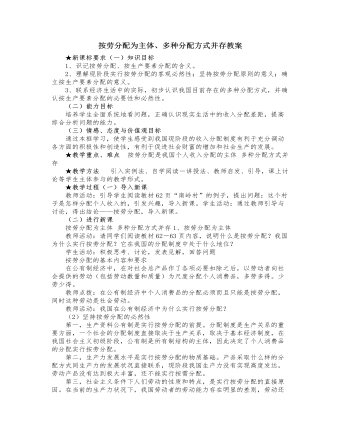
人教版高中政治必修1按劳分配为主体、多种分配方式并存教案
(3)确立按生产要素分配的意义确立按生产要素分配的原则,是对市场经济条件下各种生产要素所有权存在的合理性、合法性的确认,体现了国家对公民权利的尊重,对劳动、知识、人才、创造的尊重。有利于让一切生产要素的活力竞相迸发,让一切创造社会财富的源泉充分涌流,以造福人民。(三)课堂总结、点评 通过这节课的学习,我们懂得了在我国社会主义初级阶段,实行以按劳分配为主体、多种分配方式并存的制度,把按劳分配和按生产要素分配结合起来具有客观必然性,也有重要的意义。★课余作业 组织学生撰写社会调查报告,要求学生调查自己家里的收入情况,分清哪些收入是按劳分配所得,哪些是非按劳分配收入,并进一步分析现在的收入形式与以前相比有哪些变化,这种变化给家庭的生活带来哪些影响?★教学体会本节内容是与学生生活实际密切联系的内容,在学习中应该多引入日常生产、生活中常见的一些实例,让学生去深刻理解这些知识,并能够从自己的实践中理解、把握我国分配政策的合理性。
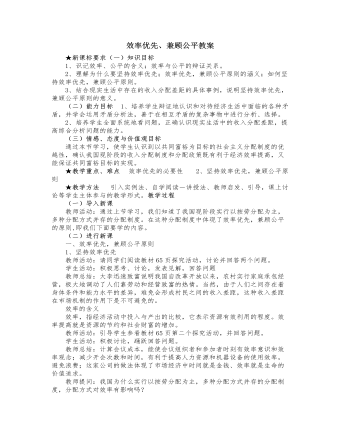
人教版高中政治必修1效率优先、兼顾公平教案
教师活动:引导学生阅读教材67页,回答:什么是效率优先,兼顾公平?如何贯彻此原则?学生活动:阅读课本,认真总结,发表见解教师点评:效率优先,实质是发展生产力优先,分配制度和分配政策要以促进生产力的发展和经济效益的提高为首要目标;兼顾公平,是指社会要将收入差距控制在合理的范围内,使分配的结果能促使人们奋进,社会具有生机喝活力。坚持效率优先、兼顾公平,首先,要允许和鼓励一部分地区和个人通过诚实劳动和合法经营先富起来,先富带后富,最终达到共同富裕。其次,既要反对平均主义,又要防止收入差距悬殊;既要落实分配政策,又要提倡奉献精神。再次,必须正确处理初次分配注重效率与再分配注重公平的关系。初次分配注重效率有利于充分调动人们的积极性。在再分配中,要加强政府对收入分配的调节,调节过高收入,取缔非法收入,提高低收入者的收入水平,通过完善社会保障制度等,把收入差距控制在一定范围之内。
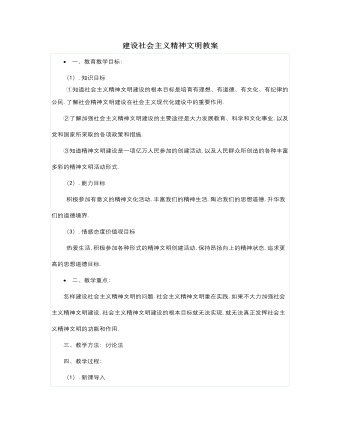
人教版高中政治必修3建设社会主义精神文明教案
师:三亚目前正在强调打造文化产业,如举办文体大赛,提升三亚知名度.如今"美丽三亚,浪漫天涯"已成为三亚一张旅游名片,以文化产业的发展带动经济旅游的发展,大家结合今天的三亚文化产业发展谈谈发展文化事业和文化产业的作用.学生:回答(略)。师:要支持文化产业发展,增强我国文化产业的整体实力和竞争力.? 3. 亿万人民的创建活动(板书) (1).人民群众是精神文明创建活动的主体。学生朗读课文P103页,理解亿万人民是精神文明创建活动的主体.师:发展先进文化,本质上是一个立足于建设中国特设社会主义伟大实践而不断进行文化创造的过程,也就是社会主义精神文明的创建过程.(2).人民群众参与精神文明创建活动的意义.师:人民群众在社会主义精神文明建设活动中,创造了丰富多彩的形式,在参与的过程中思想感情得到熏陶,思想觉悟得到启发,精神生活得到充实,道德意识得到增强,道德境界得到升华.这对整个中华民族的精神面貌,正在产生不可估量的积极影响.
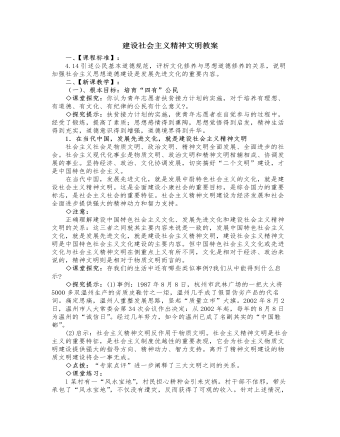
人教版高中政治必修3建设社会主义精神文明教案
(2)伟大的意义:这些精神文明创建活动,是人民群众“移风易俗”、改造社会的伟大创造,也是人民群众自我教育、自我提高的有效途径。各具特色的精神文明创建活动,使人们在自觉参与的过程中思想感情得到熏陶,思想觉悟得到启发,精神生活得到充实,道德意识得到增强,道德境界得到升华。这对整个中华民族的精神面貌,正在产生不可估量的积极影响。◇点拨:“相关链接”描述了青年志愿者活动,引导学生感悟其精神,升华道德境界,增强参与意识。(3)必然的选择:投身于社会主义精神文明建设的伟大实践,做新时期中国先进文化的传播者和建设者,是当代中国青年成长、成才的必然选择。◇拓展延伸:在群众性精神文明创建活动中涌现出的先进人物和英雄模范,像孔繁森、张海迪、徐洪刚、韩素云、李国安、徐虎、李素丽等,在全社会起到了良好的示范作用;提出的一些响亮口号,如“从我做起,从现在做起”“岗位学雷锋,行业树新风”“单位做个好职工,社会做个好公民,家庭做个好成员”等,不断激励着人们。
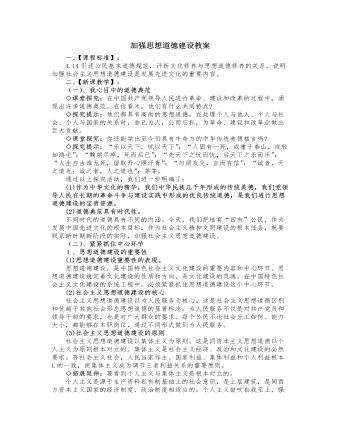
人教版高中政治必修3加强思想道德建设教案
(2)社会主义思想道德体系应该与社会主义法律规范相协调。法治和德治,从来都是相辅相成、相互促进的。法治以法律的权威性和强制性规范社会成员的行为;德治以道德的说服力和感召力提高社会成员的思想认识和道德觉悟。建设中国特色社会主义,既要加强社会主义法制建设,依法治国;也要加强社会主义思想道德建设,以德治国。◇课堂探究:你能否引述与上述道德规范相关法律条文。◇探究提示:上述道德规范见诸很多法律当中,例如:2O()5年4月27日颁布的《中华人民共和国公务员法》规定:公务员应当“忠于职守,勤勉尽责,服从和执行上级依法作出的决定和命令”“遵守纪律,恪守职业道德,模范遵守社会公德。”修订后的《中华人民共和国婚姻法》规定:“夫妻应当互相忠实,互相尊重;家庭成员间应当敬老爱幼,互相帮助,维护平等、和睦、文明的婚姻家庭关系。”
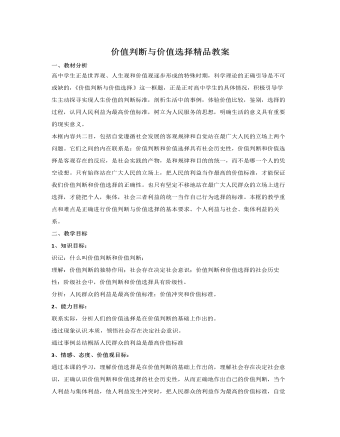
人教版高中政治必修4价值判断与价值选择精品教案
南极大地的水陆交接处,全是滑溜溜的冰层或者尖锐的冰棱。企鹅没有可以用来攀爬的前臂,也没有可以飞翔的翅膀,如何从水中上岸?纪录片《深蓝》展示,企鹅在将要上岸之时,要从海面潜入海中,沉潜到适当的深度,借用水的浮力,迅猛向上,飞出一道弧线,落于陆地之上。企鹅的沉潜是为了蓄势,看似笨拙,却富有成效。人生又何尝不是如此?沉潜绝非沉沦,而是勇敢、智慧、自强。如果我们在困难面前能沉下气来,不被“冰棱”吓倒,不被浮华迷惑,专心致志,自强不息,积聚力量,并抓住恰当的机会反弹向上,毫无疑问,我们就能成功登陆!反之,总是随波浮沉,或者怨天尤人,注定就会被命运的风浪所玩弄,直至精疲力竭。结合上述材料,运用《生活与哲学》知识对“价值观是人生的重要向导,有价值观的人生才是更美的人生”加以评析。7、有两名畜牧兽医专业毕业的大学生应聘到农村养猪场担任技术总监后,大力推广使用生态养猪法和中草药防疫技术,使养猪场步入了良性发展轨道。

人教版高中政治必修4唯物主义和唯心主义精品教案
一、教材分析《唯物主义和唯心主义》是人教版高中思想政治必修模块4《生活与哲学》第一单元第二课第二框题内容。这一框主要是通过对哲学存在和发展的具体形态的介绍,让学生从中感受什么是哲学。围绕着这个问题,教材设计了两目:第一目主要是通过对历史上各种不同的唯物主义哲学的介绍,从中概括出唯物主义的三种基本形态;第二目主要是通过对历史上各种不同的唯心主义哲学的介绍,从中概括出唯心主义的两种基本形态。二、教学目标(一)知识目标什么是唯物主义,什么是唯心主义 ;理解哲学基本问题第一方面的内容是划分唯物主义和唯心主义的唯一标准;如何区分唯物主义的三种基本形态和唯心主义的两种基本形态。(二)能力目标初步具有自觉运用唯物主义理论知识,分析和把握社会生活现象的 能力。(三)情感、态度与价值观目标在实践中坚持辨证唯物主义观点,自觉反对和批判唯心主义。三、教学重点难点1、唯物主义和唯心主义的根本观点(重点)

新人教版高中英语必修1Unit 3 Sports and Fitness-Listening and Speaking & Listening and Talking教案
Finally, after finishing the task above, the teacher is expected to instruct students to work in groups to finish the following project:Speaking ProjectWhat event or activity would you like to invite your friend to? Make a conversation with a partner.Ski Race: Zhangjiakou, a beautiful city in northern China, will host the Youth Ski Race in December.Track Meet: a great event for track –and –field lovers on 26 October.Gym Class: come and work out at a gym! You can make it.Part 2: Listening and Talking:The teacher is advised to talk with their new students about the related topic: Boys and girls , what do you think of sportsmanship? Let’s listen and find out:Play the listening and match each opinion with the right speaker. Who do you agree with? Why?Cao Jing _____________ Lily _____________ Max _____________A. An athlete should do his/her best to win.B. The girl should stop and help the other girl. Good sportsmanship is more important than wining!C. An athlete should think about honor and his/her fans if he/she is competing for his/her country.Listen again and circle the expressions that you hear in the conversation.

新人教版高中英语必修1Unit 3 Sports and Fitness- Discovering Useful Structures—tag questions教案
【教材分析】This teaching period mainly deals with the grammar: tag questions.This period carries a considerable significance to the cultivation of students’ spoken English. The teacher is expected to enable students to master this period thoroughly and consolidate the knowledge by doing some exercise of good quality.【教学目标与核心素养】1. Get students to have a good understanding of the basic usages of tag questions.2. Enable students to use the basic phrases structures flexibly.3. Develop students’ speaking and cooperating abilities.4. Strengthen students’ great interest in grammar learning.【教学重难点】1. How to enable students to have a good understanding of the basic usages of tag questions.2. How to enable students to use the basic usages of tag questions flexibly.【教学过程】Step1: 语法自主探究一、基本组成方法1.肯定式陈述部分+否定附加疑问部分(前肯后否) You often play badminton, don’t you? 你经常打羽毛球,是吗?You are going to the gym with me, aren’t you?你要和我一起去健身房,是吗?She’s been to shanghai before, hasn’t she? 她以前去过上海,是吗?2.否定式陈述部分+肯定附加疑问部分(前否后肯) It isn't a beautiful flower, is it? 那不是美丽的花,是吗?You didn't go skating yesterday, did you? 你昨天没去滑冰,是吗?They can’t finish it by Friday, can they?他们不能在星期五之前完成,是吗?

新人教版高中英语必修3Unit 1 Festivals and Celebrations-Listening &Speaking&Talking教学设计
The theme of this section is “Talk about festival activities and festival experiences”.Festival and holiday is a relaxing and interesting topic for students. This part talks about the topic from the daily life of students’. In the part A ---Listening and Speaking, there are three conversations among different speakers from three countries(Japan, Rio and China), where the speakers are participating in or going to participate in the festivals and celebrations. So listening for the relationship among them is a fundamental task. Actually, with the globalization and more international communication, it is normal for Chinese or foreigners to witness different festivals and celebrations in or out of China. In the Conversation 1, a foreign reporter is interviewing a Japanese young girl who just had participated in the ceremony of the Coming-of-Age Day on the street and asking her feeling about the ceremony and the afterwards activities. Conversation 2, Chinese girl Li Mei is witnessing the Rio Carnival for the first time, and her friend Carla gives her some advice on the costumes which enables her to match with the carnival to have a good time. Conversation 3, a Chinese guide is showing a group of foreign visitors around the Lantern Festival and introducing the customs of the festival to them. The three conversations have a strong vitality and insert the festival and cultural elements from different countries. So perceiving the festivals and cultures from different countries is the second task. At the same time, the scripts also insert the targeted grammar --- v-ing as attributive and predicative, which students can perceive and experience in a real context and make a road for the further study. That is the third task. In the Part B--- Listening and Talking, the theme is “Talk about festival experience”, which is the common topic in our daily conversations. During the conversation, Song Lin, a Chinese student, asked Canadian friend Max about how to spend Christmas. In the conversation, Song Lin talked about experience and the feelings during the Chinese Spring Festival, during which there are not only some enjoyable things but some unpleasant things. After the listening, perhaps students find there are some similarities between Christmas and the Chinese Spring Festival as there are some differences in the origins and celebrations. For example, people always visit friends and relatives, decorate their houses, have a big dinner together, chat and give presents to each other.

新人教版高中英语必修3Unit 3 Diverse Cultures-Discovering Useful Structure教学设计
Step 4 PracticeRead the conversation. Find out which words have been left out.Justin: Linlin, I’m going to Guizhou Province next month. I’m super excited! Any recommendations for places to visit?Linlin: Wow, cool! Guizhou is a province with a lot of cultural diversity. Places to visit...well, definitely the Huangguoshu Waterfall first.Justin: What’s special about the waterfall?Linlin: Well, have you ever heard of the Chinese novel Journey to the West ?Justin: Yes, I have. Why ?Linlin: In the back of the waterfall, you will find a cave, which is the home of the Monkey King.Justin: Really? Cool! I’ll definitely check it out.Linlin:And I strongly recommend the ethnic minority villages. You’ll find Chinese culture is much more diverse than you thought.Justin:Sounds great, thanks.Answers:Justin: Linlin, I’m going to Guizhou Province next month. I’m super excited! Do you have any recommendations for places to visit?Linlin: Wow, that’s cool! Guizhou is a province with a lot of cultural diversity. What are some places to visit in Guizhou ? Well, definitely the Huangguoshu Waterfall is the first place to visit in Guizhou Province.Justin: What’s special about the waterfall?Linlin: Well, have you ever heard of the Chinese novel Journey to the West ?Justin: Yes, I have heard of the Chinese novel Journey to the West . Why do you ask if I have heard of the Chinese novel Journey to the West?Linlin: In the back of the waterfall, you will find a cave, which is the home of the Monkey King from Journey to the West.Justin: That’s really true? It’s Cool! I’ll definitely check it out.Linlin:And I strongly recommend the ethnic minority villages on your trip to Guizhou Province. You’ll find Chinese culture is much more diverse than you thought it was.Justin:This all sounds great, thanks.

新人教版高中英语必修3Unit 3 Diverse Cultures-Reading for Writing教学设计
The topic of this part is “Describe a place with distinctive cultural identity”.This section focuses on Chinese culture by introducing Chinatown, whose purpose is to show the relationship between the Chinese culture and American culture. The Chinese culture in Chinatown is an important part of American culture. Chinatown is an important window of spreading Chinese culture and the spirit homeland of oversea Chinese, where foreigners can experience Chinese culture by themselves.Concretely, the title is “Welcome to Chinatown!”, from which we can know that the article aims at introducing Chinatown. The author used the “Introduction--Body Paragraph--Conclusion” to describe the people, language, architecture, business, famous food and drinks and people’s activities, which can be a centre for Chinese culture and shows its unique charm.1. Read quickly to get main idea; read carefully to get the detailed information.2. Learn the characteristics of writing and language.3. Learn to introduce your own town according to the text.4. Learn to correct others’ writing.1. Learn the characteristics of writing and language.2. Learn to introduce your own town according to the text.Step 1 Lead in ---Small talkIn the reading part, we mentioned the Chinatown of San Francisco. How much do you know about Chinatown of San Francisco ?Chinatown is a main living place for Chinese immigrants, where you can see many Chinese-style buildings, costumes, operas, restaurants, music and even hear Chinese.Step 2 Before reading ---Predict the contentWhat is the writer’s purpose of writing this text ? How do you know ?From the title(Welcome to Chinatown) and some key words from the text(tourist, visit, visitors, experience), we can know the purpose of the text is to introduce Chinatown and show the relationship between Chinese culture and American culture.

新人教版高中英语必修3Unit 4 Space Exploration-Discovering Useful Structure教学设计
The theme of the section is “Describe space facts and efforts to explore space”. Infinitives are one of non-finite verbs, as the subjects, objects, predicative, attributes and adverbials. This unit is about space exploration, which is a significant scientific activity, so every scientific activity has strong planning. Therefore, using the infinitives to show its purpose, explanations or restrictions is the best choice.1. Learn the structure, functions and features of infinitives.2. Learn to summarize some rules about infinitives to show purpose and modify.3. Learn to use infinitives in oral and writing English. 1. Learn the structure, functions and features of infinitives.2. Learn to summarize some rules about infinitives to show purpose and modify.3. Learn to use use infinitives in oral and writing English.Step 1 Lead in---Pair workLook at the following sentences and focus on the italicized infinitives. In pairs, discuss their functions. 1. I trained for a long time to fly airplanes as a fighter pilot..(作目的状语)2. As we all know, an astronaut needs to be healthy and calm in order to work in space..(作目的状语)3. First of all, you must be intelligent enough to get a related college degree..(作目的状语)4. Some scientist were determined to help humans realise their dream to explore space..(作定语)5. On 12 April 1961, Yuri Gagarin became the first person in the world to go into space..(作定语)Summary:1. 不定式的结构:to+do原形。2. 分析上面的句子,我们知道在描述太空探索时,动词不定式不仅可以用来表目的,还可以用来作定语,表修饰。

新人教版高中英语必修3Unit 4 Space Exploration-Reading and Thinking教学设计二
The theme of this unit focuses on “space exploration.” Students will learn about the training and experience needed to become an astronaut. The text is mainly about the development of space exploration. On the one hand, the text helps students to have a good understanding about the great feats humans have achieved, on the other hand, they will further understand the contributions that we Chinese have achieved, and feel confident and proud about our homeland and strengthen their love for our country. The teacher should instruct students to aim high and study harder to make great progress in the space career if possible.1. Read about the development and value of space exploration.2. Explore the mysteries of the universe and the achievements in space exploration.3. Skillfully use the vocabulary of this text to cultivate self-study ability 4. Develop cooperative learning ability through discussion.1. Enable the Ss to talk about the development and value of space exploration.2. Guide the Ss to summarize the main idea of each paragraph as well as the main idea of the text.3. Help Ss comprehend the main reasons for space exploration. Multi-media, textbook, notebooks.Step 1: Warming up and predictionLook at the title and the pictures of the text and predict what the text will be about?2. What are the main reasons for space exploration?

新人教版高中英语必修3Unit 4 Space Exploration-Reading for Writing教学设计二
⑦在我看来, 探索太空是值得的。As far as I am concerned, it is worthwhile to explore the space.Step 10 Writing---draftRecently, students in our class have had heated a discussion on whether space is worth exploring. Students hold different ideas about it.30% of us think space exploration is not worthwhile. They think space is too far away from us and our daily life and is a waste of money. And the money spent on space exploration can be used to solve the earth’s problems such as starvation and pollution.On the other hand,70% think space is worth exploring because we have benefited a lot from it,such as using satellites for communication and weather forecast. What’s more,with further space research,we may solve the population problem by moving to other planets one day. Also,space research will enable us to find new sources to solve the problem of energy shortages on the earth.As far as I am concerned, it is worthwhile to explore the space. Not only can it promote the development of society but also enrich our life. Step 11 Pair workExchange drafts with a partner. Use this checklist to help your partner revise his/her draft.1.Does the writer explain why he/she changed/wanted to change?2.Does the writer tell how the changes have improved or will improve his/her life?3.Is the text well-organised?4.Does the writer use words and expressions to show similarities and differences?5.Are there any grammar or spelling errors?6.Does the writer use correct punctuation?

新人教版高中英语必修3Unit 5 The Value of Money-Listening &Speaking&Talking教学设计
4. A:We’d like to have someone to say a word at the beginning to welcome the group.B:↙Who?A:We thought that you or Dr.Johnson might do it.B用降调说Who,其意思是问,对方想让谁在开场时致欢迎词。Step 6 Pronunciation---Practice1. Listen to the short conversation and mark the intonation with ↗, ↙ or ↙, ↗. Then discuss with a partner what they intend to convey by using different intonation.Owner: You know what ?↗ It’s a million-pound bank note↙.Waiter 1: Really ?↗(question)Waiter 2: Really !↙(unbelievable and surprised)Waiter 3: Really ?!↙↗(first question then surprised)2. Listen to the conversations. Underline the parts that are stressed and mark the intonation. Then talk about the implied meanings of the responses with different intonations. Listen again and repeat.1) Henry: It’s a nice suit.Owner: Oh, it’s perfect!↙(The intonation means it is very suitable for Henry.)2) Henry: Well, that’s very kind of you.Owner: Kind, sir ?↗(what you said is not right) No, it’s kind of you. You must come whenever you want and have whatever you like. Just having you sit here is a great honour !!↙(welcome you to come again)3)Henry:Well, to be honest, I have none. Oliver:(happily) What luck!(excited) Brother↗, what luck!↙(It means “Didn’t you hear it?”)Henry: Well, it may seem lucky to you but not to me!↗(angry) If this is your idea of some kind of joke, I don’t think it’s very funny. Now if you’ll excuse me, I ought to be on my way.↙(If so, I would leave.)Roderick: Please don’t go↙...(hope Henry can wait for a moment)Part B Viewing and Talking---Describe people’s changing attitudes in a film clipStep 1 Before-listening---Tell the filmYou are going to watch part of the film The Million Pound Bank Note. Look at these photos and guess what happens in the film.

新人教版高中英语必修3Unit 5 The Value of Money-Listening &Speaking教学设计
Step 4: Listen again and decide if the following statements are true (T) or false (F).1 It was the first time Chen Liyan's story was reported. T口 F口2 Chen found 10,000 yuan in a small plastic bag in Taiyuan railway station口 F口3 Wang Zheng apologized to Chen because he couldn't offer her more money. T口 F口4 Chen took out a large loan to cure her daughter, T口 F口5 Wang set up a fundraising website for Chen's daughter after Chen told him about her situation. T口 F口Step 5:After listening, discuss the questions.1 What kind of person do you think Chen Liyan is?Chen Liyan is generous and honest because she returned a large sum of money to the owner.2 Did Chen return the money because she didn't need it?No. She returned the money because it was the right thing to do. Evidence for this is that she refused to accept the reward money because she felt that it had not been earned. 3 Is it common for people to do what Chen did?It depends on the culture. In some countries it is quite common to return money that has been found. In other countries, people believe "Finders are keepers!" 4 How did Wang Zheng feel about the return of his money?He must have been very happy and relieved to have gotten his money back. We know this because he thanked Chen repeatedly and even offered her a reward.5 Why did Ma Dongbao tell Wang about Chen's family?He must have had great sympathy for Chen and her daughter and wanted to help them.'We know this because he arranged help for them. 6 How did the news reporter feel about Chen's actions?The news reporter felt that it showed that money wasn't the most important thing in life. We know this because the reporter told us that this is what Chen believes. and then said, “that's a great attitude to take."

新人教版高中英语必修3Unit 5 The value of money-Reading and Thinking教学设计二
? Could you offer me some kind of work here?? I don’t want your charity, I just want an honest job.? Careless: I landed in Britain by accident.Step 7:Consolidation.? Find Henry? Roderick and Oliver were I .making a bet when they saw Henry, a poor young man. ? Know Henry? About a month ago, Henry was sailing and later he found himself carried out to sea by a strong wind. Fortunately, he 2.was spotted by a ship. And it was the ship that brought him to 3.England? Offer money to Henry ? Oliver and Roderick gave Henry a letter and told him that there was money in it. They 4.persuaded him to accept it, and made him 5.promise that it wouldn't be opened until 2 o'clock.Step 8:Language pointsa large amount of: a large quantity of; a great deal ofe.g. They bought a large amount of furniture before they moved their new house.make a bet: make an arrangement to risk money, etc. on an event of which the result is doubtful.e.g. We made a bet on the result of the match.permit sb to do something: allow somebody to do somethinge.g. My mother doesn’t permit me to ride in the street after it rained.by accident: as a result of chancee.g. I only found it by accident.stare at: look at somebody or something with the eyes wide open in a fixed gaze( in astonishment, wonder, fear, etc)to be honest: to tell you the truth; to be franke.g. To be honest, I don’t think we have a chance of winning.Step7 Homework:What do you think will happen to Henry? Will the bank-note help him or get him into trouble?

新人教版高中英语必修3Unit 5 The Value of Money-Reading for Writing教学设计二
2. 您能看到, 我头发太长了。You can see that my hair is much too long.3. 无论什么时候, 只要您想回来就回来。Please come back whenever you want.4. 您仅有很少的头发要理! You only have too little hair to cut !5. 为您服务是我的荣幸!It is my honour to serve you!Step 9 Writing(Henry is walking down the street when he sees a sign for a place that cuts hair. He decides to have it cut. )H=Henry B=BarberH: Good afternoon, I’d like to have my hair cut, if I may. (The barber looks at Henry’s hair and continues cutting another man’s hair. ) Er, I’d really like a haircut. As you can see it’s much too long. B: (in a rude manner) Yes, I can see that. Indeed, I can. H: Fine, well, I’ll have a seat then. (He sits in one of the barber’s chairs. The barber turns to look at Henry. )B: It’s quite expensive here, you know! Are you sure you can afford it?H: Yes. I think so. (After his hair is cut, the barber tells Henry how much he must pay. Henry shows the barber the bank note. )B: Why Mr. . . (looks shocked)H: Adams. Henry Adams. I’m sorry. I don’t have any change. B: Please don’t worry! (wearing a big smile) Nothing to worry about! Nothing at all! Please come back whenever you want, even if you only have too little hair to cut! It will be my honour to serve you!Step 10 Pair workExchange drafts with a partner. Use this checklist to help your partner revise his/her draft.1. Are all the elements of a play included and in good order ?2. Do the character use suitable language ?3. Are the stage directions clear and useful ?4. Is the plot clear and exciting enough ?